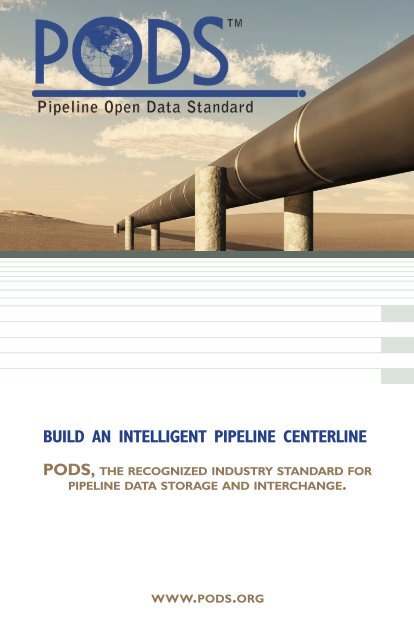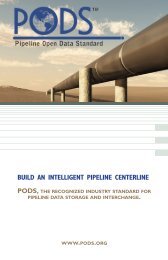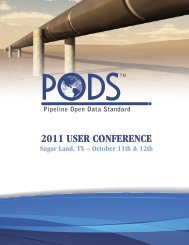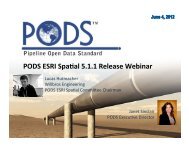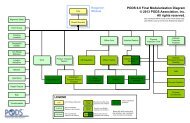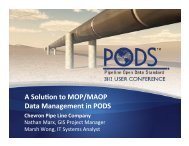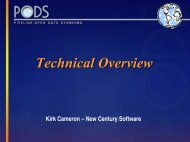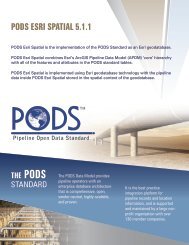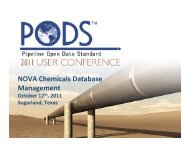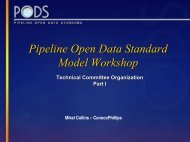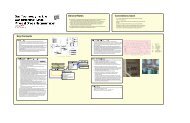Download the PODS Brochure
Download the PODS Brochure
Download the PODS Brochure
Create successful ePaper yourself
Turn your PDF publications into a flip-book with our unique Google optimized e-Paper software.
uild an intelligent pipeline centerline<br />
<strong>PODS</strong>, <strong>the</strong> recognized industry standard for<br />
pipeline data storage and interchange.<br />
www.pods.org
what is <strong>the</strong> <strong>PODS</strong> pipeline data model?<br />
“<strong>PODS</strong> is mission critical”<br />
The <strong>PODS</strong> Pipeline Data Model provides <strong>the</strong> database architecture Pipeline Operators<br />
use to store critical information and analysis data about <strong>the</strong>ir pipeline<br />
systems, and to manage this data geospatially in a linear-referenced database which can<br />
<strong>the</strong>n be visualized in any GIS platform.<br />
<strong>PODS</strong> stores asset specifications, inspections, integrity, regulatory compliance, risk, historic,<br />
operational and geographic information, to support <strong>the</strong> visualization, analysis, and<br />
systematic decision making required for responsible pipeline management.<br />
TABLE OF CONTENTS<br />
What <strong>PODS</strong> does for pipeline companies............................... 1<br />
<strong>PODS</strong>, a fundamental component of a pipeline GIS............ 2<br />
<strong>PODS</strong> implementation methods................................................ 3<br />
<strong>PODS</strong> Relational............................................................................ 4<br />
<strong>PODS</strong> ESRI Spatial........................................................................ 5<br />
What data does <strong>PODS</strong> manage?.............................................6-7<br />
How are companies leveraging <strong>PODS</strong>?............................... 8-9<br />
Components of <strong>the</strong> <strong>PODS</strong> Pipeline Data Model............ 10-11<br />
Evolution of <strong>the</strong> <strong>PODS</strong> Pipeline Data Model........................12<br />
Collaborating to develop Industry Best Practices..............13<br />
The <strong>PODS</strong> Association............................................................... 14<br />
Structure of <strong>the</strong> <strong>PODS</strong> Association......................................... 15<br />
<strong>PODS</strong> Mission Statement........................................................... 16<br />
<strong>PODS</strong> Documentation................................................................ 17<br />
Benefits of <strong>PODS</strong> membership........................................... 18-19<br />
How to join <strong>PODS</strong>?.....................................................................20<br />
How to contact <strong>PODS</strong>?.....................................................21
what <strong>PODS</strong> does for pipeline companies<br />
• <strong>PODS</strong> delivers a comprehensive and robust pipeline data architecture<br />
which meets <strong>the</strong> information and technological requirements of today’s pipeline<br />
companies.<br />
•<br />
<strong>PODS</strong> lowers <strong>the</strong> risk, cost, and time required to implement a<br />
pipeline GIS. Maintaining a single pipeline data repository helps Pipeline<br />
Operators to improve <strong>the</strong> quality, quantity and timeliness of pipeline information<br />
managed. Providing clear, concise definitions, and <strong>the</strong> ability to clearly delineate data<br />
ownership, <strong>PODS</strong> promotes better business processes and work flows, and reduces data<br />
transfer between software applications and multiple databases.<br />
• <strong>PODS</strong> leverages a broad knowledge-base, across multiple pipeline operating<br />
companies and service providers, who have worked collaboratively since 1998 to<br />
develop and refine <strong>the</strong> <strong>PODS</strong> Pipeline Data Model, deemed <strong>the</strong> best-practice pipeline<br />
data architecture in <strong>the</strong> industry.<br />
•<br />
<strong>PODS</strong> is an Open Standard. This allows multiple vendors to develop software<br />
products to interact with <strong>the</strong> <strong>PODS</strong> database. Pipeline Operators can choose software<br />
applications based on features, cost, and usability, ra<strong>the</strong>r than being tied to a single<br />
vendor’s proprietary data model.<br />
• <strong>PODS</strong> supports <strong>the</strong> growing needs of <strong>the</strong> pipeline industry through effective and<br />
collaborative efforts. Membership immediately networks you into a global <strong>PODS</strong><br />
community, and access to a wealth of technical knowledge and experience<br />
from o<strong>the</strong>r <strong>PODS</strong> members is made available to you.<br />
1
<strong>the</strong> pods pipeline data model is a fundamental component<br />
of a pipeline geographic information system (gis)<br />
Safety,<br />
Reliability,<br />
Compliance<br />
Integrity<br />
Management<br />
Data Management<br />
Data standards (<strong>PODS</strong>) are <strong>the</strong><br />
foundation for quality data management<br />
practices. Good data management<br />
practices are necessary for integrity<br />
management, improved safety, reliability,<br />
and regulatory compliance.<br />
Data Standards<br />
<strong>PODS</strong> stores pipeline geographic locations, asset specifications, inspections, integrity,<br />
regulatory compliance, risk analysis, operational, and historic data to support <strong>the</strong><br />
visualization, analysis, and systematic decision making required for responsible pipeline<br />
management. Pipeline Operators use <strong>PODS</strong> to manage, verify, analyze, maintain, and deliver<br />
relevant information quickly and reliably to end users and applications.<br />
2
<strong>PODS</strong> implementation methods<br />
<strong>the</strong> <strong>PODS</strong> pipeline data model may be implemented as ei<strong>the</strong>r<br />
a relational database or a geodatabase.<br />
The <strong>PODS</strong> Relational Database may be implemented on ei<strong>the</strong>r Oracle or SQL Server RDBMS<br />
platforms. The <strong>PODS</strong> Relational Database has <strong>the</strong> capacity to store a variety of spatial content<br />
and to interface with a multitude of GIS platforms.<br />
The <strong>PODS</strong> ESRI Spatial Geodatabase has been specifically developed for implementation as<br />
an object-relational ESRI Geodatabase for use with ESRI’s ArcGIS® and ArcSDE® products.<br />
Unlike <strong>the</strong> <strong>PODS</strong> Relational Database, <strong>PODS</strong> ESRI Spatial can only be implemented with ESRI<br />
technology.<br />
Each company selects <strong>the</strong> <strong>PODS</strong> implementation method best suited to <strong>the</strong>ir<br />
organization. This decision may be based on factors such as existing IT infrastructure,<br />
centralized or regional deployment, planned integration across <strong>the</strong>ir organization, user<br />
community expertise, and <strong>the</strong> selection of available software applications.<br />
3
<strong>PODS</strong> relational<br />
While pipelines are clearly linear objects, <strong>PODS</strong> Relational stores <strong>the</strong> linear nature of <strong>the</strong><br />
pipeline centerline deconstructed into sequenced (X, Y, Z) coordinates. This allows <strong>PODS</strong><br />
Relational to utilize <strong>the</strong> inherent functionality found in modern Relational Database<br />
Management Systems (RDBMS).<br />
While <strong>the</strong> <strong>PODS</strong> Relational model provides GIS neutrality, it is usually spatially enabled<br />
with a GIS system. This allows <strong>PODS</strong> Relational to easily integrate with o<strong>the</strong>r IT systems and<br />
databases. <strong>PODS</strong> Relational is <strong>the</strong> most widely deployed enterprise implementation of <strong>the</strong><br />
<strong>PODS</strong> Data Model.<br />
<strong>PODS</strong> includes more than 670 tables that can be categorized into <strong>the</strong> four functional groups as<br />
listed below.<br />
• The Core Tables store <strong>the</strong> pipeline hierarchy and include Line, Route, Series and<br />
Station Point. The Core Tables also define <strong>the</strong> linear distances, or stationing, used<br />
to reference <strong>the</strong> location of Events on <strong>the</strong> pipelines. The Core Tables also store <strong>the</strong><br />
instructions that control how individual components are re-assembled into a pipeline<br />
centerline.<br />
•<br />
The Location Tables store <strong>the</strong> centerline of <strong>the</strong> pipeline, as well as <strong>the</strong> GPS<br />
coordinates of specified features, including offline features. The Location Tables also<br />
serve as <strong>the</strong> translation point between <strong>the</strong> <strong>PODS</strong> Relational Database and a Geographic<br />
Information System (GIS). The <strong>PODS</strong> Relational Database has <strong>the</strong> capacity to store a<br />
variety of spatial content and to interface with a multitude of GIS platforms.<br />
• The Event Tables store <strong>the</strong> information about <strong>the</strong> pipelines such as pipeline<br />
specifications and features, operational measures, integrity and inspection results,<br />
geographic features, repair and maintenance history, analysis records, and regulatory<br />
compliance information. These data records are stored as ei<strong>the</strong>r linear or point<br />
features. The Event Tables also provide a mechanism to link to external documents<br />
through <strong>the</strong> <strong>PODS</strong> database.<br />
•<br />
The Code Look-up Tables are used to limit entries in certain fields to<br />
predetermined sets of allowable values. The Pipeline Operator typically determines <strong>the</strong><br />
values for <strong>the</strong> Code Look-up Tables early in <strong>the</strong> implementation process. Operators can<br />
use company-specific values, example values provided by <strong>PODS</strong> for some tables, or a<br />
combination of <strong>the</strong> two.<br />
4
<strong>PODS</strong> esri spatial<br />
The <strong>PODS</strong> ESRI Spatial model is a derivative of <strong>the</strong> <strong>PODS</strong> Relational model, but designed<br />
for implementation as an object-relational ESRI geodatabase. <strong>PODS</strong> ESRI Spatial contains <strong>the</strong><br />
tables, attributes and domains of <strong>the</strong> <strong>PODS</strong> Relational model, but is designed specifically for an<br />
ESRI SDE deployment.<br />
The <strong>PODS</strong> ESRI Spatial model was designed to leverage advantages inherent in ESRI<br />
Geodatabase technology, including:<br />
• The object-relational structure of <strong>the</strong> <strong>PODS</strong> ESRI<br />
Spatial Geodatabase precludes <strong>the</strong> need to<br />
manage synchronization between <strong>the</strong> relational<br />
database and a separate GIS system.<br />
• Data versioning<br />
• History tracking<br />
• Storage of offline spatial data (such as<br />
roads, water bodies or structures)<br />
• Geoprocessing tools<br />
• Linear referencing<br />
• Interoperability with o<strong>the</strong>r geographic data sets<br />
5
what data does <strong>PODS</strong> manage?<br />
<strong>PODS</strong>-member companies have worked collaboratively since 1998 to develop and<br />
refine <strong>the</strong> <strong>PODS</strong> Pipeline Data Model to meet <strong>the</strong> data management needs of today’s pipeline<br />
companies. Technological advancements in inspection, integrity and risk analysis, GIS, field<br />
data collection, and information management technologies have been incorporated into <strong>PODS</strong><br />
as <strong>the</strong>y have become available.<br />
some of <strong>the</strong> categories of data managed within a <strong>PODS</strong> database:<br />
• Pipeline Centerline Geographic Location<br />
• Pipeline Asset Specifications<br />
• Design and Construction Data<br />
• Regulatory Compliance Information<br />
• Construction Inspection Data<br />
• Risk Analysis Data and Results<br />
6
what data does <strong>PODS</strong> manage?<br />
• Physical Inspections<br />
• Close Interval Surveys<br />
• Crossings<br />
• Stress Corrosion Cracking Potential<br />
• Leak Surveys<br />
• Operating Measures<br />
• Offshore Facilities<br />
• Compressors and Pumps<br />
• Equipment Maintenance and Inspections<br />
• Repairs<br />
• Offline Events<br />
• Site Facilities<br />
• Land Ownership and Right-of-way (ROW)<br />
• Links to External Documents<br />
• One Call Tickets<br />
• Pipeline Damage<br />
• Cathodic Protection Facilities and Inspections<br />
• Inline Inspections (ILI)<br />
• MAOP Records and Analysis Data<br />
• In-service Dates<br />
7
how are companies leveraging <strong>PODS</strong>?<br />
<strong>PODS</strong> provides a singular integration platform for managing pipeline data. A <strong>PODS</strong><br />
deployment bridges departmental and geographic boundaries, and eliminates data silos, to<br />
enhance productivity, timeliness, accuracy, and automation.<br />
“<strong>PODS</strong> provides a standard way for collecting, maintaining,<br />
managing, and reporting pipeline data.”<br />
Pipeline Operators use <strong>PODS</strong> to improve data management practices, and have integrated<br />
<strong>PODS</strong> on an enterprise level to support key business processes and work flows, including:<br />
• Regulatory Submissions and Audits<br />
• Integrity Management<br />
• Spatial Analysis<br />
• Corrosion Prevention<br />
• Regulatory Compliance<br />
• Business Development<br />
• Strategic Planning<br />
• Risk Analysis<br />
• Pipeline Damage Prevention<br />
• Emergency Response Planning<br />
• Engineering and Field Operations<br />
8
how are companies leveraging <strong>PODS</strong>?<br />
• Web-based Mapping<br />
• Right-of-Way Management<br />
• Financial and Property Tax Accounting<br />
• Hydraulic Modeling<br />
• Field Data Collection and Verification<br />
• Public Awareness<br />
• Repairs and Maintenance<br />
• One Call Ticket and Boundary Analysis<br />
• Spill Impact Analysis<br />
• Class Location and Gas HCA Analysis<br />
• Work Management<br />
• Situational Awareness<br />
• Mobile Field Data Access<br />
9
Location<br />
The Location Tables<br />
store geographic locations<br />
and coordinate information.<br />
The Event Tables store <strong>the</strong> pipeline<br />
specifications and features, operational<br />
measures, integrity and inspection results,<br />
crossings, repair and maintenance history,<br />
analysis results, and regulatory compliance<br />
information.<br />
The Code Look-up Tables (not shown<br />
on <strong>the</strong> main <strong>PODS</strong> diagram) are used to<br />
limit entries in certain fields to predetermined<br />
sets of allowable values.<br />
10
Components of <strong>the</strong> <strong>PODS</strong> pipeline data model<br />
Stationed Centerline<br />
The Core Tables store <strong>the</strong> pipeline<br />
hierarchy and include Line, Route,<br />
Series and Station Point.<br />
11
Evolution of <strong>the</strong> <strong>PODS</strong> pipeline data model<br />
Since its inception, <strong>the</strong> <strong>PODS</strong> Association has supported continued development of <strong>the</strong> <strong>PODS</strong><br />
Pipeline Data Model in order to meet <strong>the</strong> evolving needs of pipeline operating companies.<br />
Government regulation and technological advancement of integrity and risk management<br />
applications has driven much of this progress.<br />
Below is a brief overview of how <strong>the</strong> <strong>PODS</strong> Pipeline Data Model has been expanded to meet <strong>the</strong><br />
continually growing needs of pipeline companies.<br />
ISAT<br />
1995<br />
<strong>PODS</strong> 2.0<br />
1998<br />
<strong>PODS</strong> 3.2<br />
2004<br />
<strong>PODS</strong> 4.0<br />
2006<br />
<strong>PODS</strong> 5.0<br />
2009<br />
<strong>PODS</strong> 5.1<br />
2011<br />
Tables 72 184 453 645 652 678<br />
Sub-Models 0 48 146 198 198 203<br />
Columns - 1,080 3,228 4,888 4,843 1 5,171<br />
1<br />
Reduced because ID columns were dropped.<br />
<strong>PODS</strong> 6.0 (4Q2012)<br />
The next release of <strong>the</strong> <strong>PODS</strong> Data Model (6.0) will offer new <strong>PODS</strong> implementations<br />
<strong>the</strong> option to customize <strong>the</strong>ir deployment of <strong>the</strong> model to suit <strong>the</strong>ir company’s specific<br />
objectives. In <strong>PODS</strong> 6.0, <strong>the</strong> model has been modularized so that only <strong>the</strong> Core Module is<br />
required, and all o<strong>the</strong>r modules are optional.<br />
Modularization will help new member companies reduce complexity by allowing <strong>the</strong>m<br />
to select just <strong>the</strong> parts of <strong>the</strong> model <strong>the</strong>y wish to deploy. Modularization also positions <strong>the</strong><br />
Association to incrementally improve <strong>the</strong> model via minor releases to individual modules,<br />
to release targeted modules with functions specific to regional or industrial segments, and<br />
to provide more timely updates to <strong>the</strong> model.<br />
12
collaborating to develop industry best practices<br />
There are numerous and far-reaching benefits to <strong>the</strong> pipeline industry in <strong>the</strong> establishment of<br />
non-proprietary (open) data standards and best practices.<br />
The <strong>PODS</strong> Association works with industry partner organizations to provide a framework for<br />
industry stakeholders to work collaboratively to develop data standards for <strong>the</strong> benefit of <strong>the</strong><br />
pipeline industry as a whole.<br />
<strong>PODS</strong> establishes chartered Work Groups consisting of <strong>PODS</strong> member companies, industry<br />
organizations (such as NACE), and o<strong>the</strong>r interested parties to work jointly on <strong>the</strong>se projects.<br />
The collaboratively-developed standards typically govern data structures and formats to enable<br />
electronic integration of data, standardized collection scope and format, and to allow for<br />
comparison of data ga<strong>the</strong>red for a given pipeline segment at different times, regardless of <strong>the</strong><br />
software system used to collect it.<br />
<strong>PODS</strong> work groups have included:<br />
• External Corrosion Direct Assessment (ECDA)<br />
• Inline Inspection (ILI)<br />
• One Call and Damage Prevention<br />
• <strong>PODS</strong> ESRI Spatial<br />
• <strong>PODS</strong> Oracle Spatial<br />
some recently announced <strong>PODS</strong> work groups include:<br />
• Alternate Referencing<br />
• <strong>PODS</strong> Gas Distribution Model (GDM)<br />
• Data Standards for New Construction<br />
13
<strong>the</strong> <strong>PODS</strong> association<br />
The <strong>PODS</strong> Association was created in 1998 to develop and support open data storage and<br />
interchange standards to meet <strong>the</strong> specific data management needs of pipeline companies.<br />
<strong>PODS</strong> is a not-for-profit, vendor-neutral, pipeline industry association.<br />
The <strong>PODS</strong> Board of Directors and Technical Committee are comprised of pipeline industry<br />
professionals whose companies support <strong>the</strong> <strong>PODS</strong> Association and contribute <strong>the</strong>ir employees’<br />
time to fur<strong>the</strong>r <strong>the</strong> work of <strong>the</strong> Association.<br />
<strong>PODS</strong> member companies include pipeline operators, software, service, engineering, and data<br />
providers, government agencies, and industry associations, from <strong>the</strong> U. S. and around <strong>the</strong> globe.<br />
OUR HISTORY<br />
In 1998, a small number of application developers were asked by<br />
<strong>the</strong> Gas Research Institute (GRI) to help speed <strong>the</strong> development of<br />
an expanded ISAT data model. These individuals (<strong>the</strong> GRI Working<br />
Group) generously donated <strong>the</strong>ir companies’ time, expertise and<br />
intellectual property to extend <strong>the</strong> original ISAT data model by adding<br />
important functionality and significantly expanding <strong>the</strong> original scope<br />
of ISAT. The effort has taken a very pragmatic approach with <strong>the</strong> goal of<br />
collaboratively developing data standards for <strong>the</strong> pipeline industry, with<br />
an emphasis on geospatial technology.<br />
14
structure of <strong>the</strong> <strong>PODS</strong> association<br />
The <strong>PODS</strong> Board of Directors consists of 11 elected Directors from <strong>PODS</strong>-member<br />
companies who govern <strong>the</strong> Association. The primary responsibility of <strong>the</strong> Board is to direct <strong>the</strong><br />
Association and Technical Committee in developing data storage and interchange standards to<br />
meet <strong>the</strong> evolving needs of pipeline companies. A minimum of six Board seats are reserved for<br />
pipeline operating companies.<br />
The <strong>PODS</strong> Technical Committee (TC) is responsible for ongoing maintenance and<br />
development of <strong>the</strong> <strong>PODS</strong> Pipeline Data Model and its implementations. The TC is currently<br />
subdivided into four teams, each supporting various aspects of <strong>the</strong> <strong>PODS</strong> Pipeline Data Model.<br />
The Technical Committee Steering Committee oversees <strong>the</strong> work of <strong>the</strong>se teams, and is made<br />
up of <strong>the</strong> Chairperson from each team, <strong>the</strong> Board Liaison to <strong>the</strong> TC, and <strong>the</strong> Executive Director.<br />
The <strong>PODS</strong> Executive Director provides leadership to <strong>the</strong> Association and <strong>the</strong> Board in<br />
<strong>the</strong> development, management, evaluation, and execution of programs and initiatives, and<br />
provides proper alignment of staff and financial resources to meet defined goals and objectives.<br />
The Executive Director also manages membership, public relations, marketing, <strong>the</strong> annual<br />
User Conference, <strong>the</strong> <strong>PODS</strong> website, and ensures strong representation of <strong>the</strong> Association to <strong>the</strong><br />
pipeline industry.<br />
<strong>PODS</strong> Member Companies support <strong>the</strong> work of <strong>the</strong> Association, and represent <strong>the</strong>ir<br />
opinions and priorities through voting in <strong>PODS</strong> elections, through <strong>the</strong> volunteer participation<br />
of <strong>the</strong>ir employees on committees, working groups, forums, conferences, meetings, and by<br />
submitting comments and suggestions to <strong>the</strong> Association.<br />
15
<strong>the</strong> <strong>PODS</strong> mission statement<br />
The <strong>PODS</strong> Association is a not-for-profit industry standards association that develops and<br />
maintains <strong>the</strong> <strong>PODS</strong> Pipeline Data Model, and pipeline data storage and interchange standards<br />
for <strong>the</strong> pipeline industry. The organization provides its members an environment to share<br />
knowledge by establishing a center of excellence for facilitating a global <strong>PODS</strong> community<br />
of practice. The Association’s focus is to provide its domestic and international members a<br />
framework for leveraging industry standards in support of Information Management solutions<br />
related to onshore and offshore pipelines, ga<strong>the</strong>ring systems, and distribution systems as<br />
required to support <strong>the</strong> interests of its members.<br />
This Mission Statement is fur<strong>the</strong>r interpreted as a set of guiding principles<br />
that are used to direct <strong>the</strong> Association’s activities and pursuits.<br />
guiding principles<br />
improve interoperability<br />
Improving <strong>the</strong> interoperability of <strong>the</strong> <strong>PODS</strong> Data Model to enable reliable<br />
exchange of information between multiple databases, applications, vendor<br />
software, and even between different operators, is fundamental to <strong>the</strong> <strong>PODS</strong><br />
mission and objectives.<br />
member knowledge sharing<br />
The value of <strong>the</strong> <strong>PODS</strong> user community is significant. Most of <strong>the</strong> issues<br />
faced by any one member are common across <strong>the</strong> industry. Fostering<br />
an environment of knowledge sharing of non-propriety information will<br />
enhance <strong>the</strong> value of <strong>the</strong> Association to its members, as well as fur<strong>the</strong>r <strong>the</strong><br />
adoption of data standards in <strong>the</strong> pipeline industry.<br />
growth<br />
Growth encompasses <strong>the</strong> growth and development of <strong>the</strong> data standards<br />
offered to <strong>the</strong> industry, as well as growth in membership and engagement of<br />
its members in Association endeavors.<br />
16
<strong>PODS</strong> documentation<br />
With each new release, <strong>the</strong> <strong>PODS</strong> Technical Committee updates <strong>the</strong> 1500+ page <strong>PODS</strong> Data<br />
Dictionary. This document describes <strong>the</strong> tables and columns contained within <strong>the</strong> <strong>PODS</strong><br />
Pipeline Data Model. It also defines <strong>the</strong> data types, constraints, foreign keys, and references<br />
contained within <strong>the</strong> data model. The Data Dictionary also provides an Entity Relationship<br />
Diagram (ERD) for each table in <strong>the</strong> data model and <strong>the</strong> executable code to build each table<br />
in <strong>the</strong> database.<br />
All of <strong>the</strong> relevant documentation for each new release of <strong>the</strong> <strong>PODS</strong> Pipeline Data Model is<br />
contained within <strong>the</strong> <strong>PODS</strong> release .zip files available for member download from <strong>the</strong> <strong>PODS</strong><br />
website.<br />
Formal <strong>PODS</strong> documentation which is not release-specific is also posted on Wiki-<strong>PODS</strong>.<br />
Draft <strong>PODS</strong> documentation is also available on Wiki-<strong>PODS</strong> during <strong>the</strong> development process.<br />
The intent of posting draft documentation is to invite <strong>PODS</strong> member companies to test and<br />
comment on <strong>the</strong>ir company’s experience with <strong>the</strong> information presented, so that <strong>the</strong> final<br />
product has <strong>the</strong> widest, most comprehensive applicability.<br />
17
what are <strong>the</strong> benefits to being<br />
a <strong>PODS</strong> member company?<br />
1 – LEGAL USE OF THE <strong>PODS</strong> PIPELINE DATA MODEL. The <strong>PODS</strong> Pipeline Data<br />
Model is <strong>the</strong> intellectual property of <strong>the</strong> <strong>PODS</strong> Association, Inc. and <strong>the</strong> Association holds <strong>the</strong><br />
exclusive right, title, and interest, including copyright, to this intellectual property. In order<br />
to legally use <strong>the</strong> <strong>PODS</strong> Pipeline Data Model, your company must be a member of <strong>the</strong> <strong>PODS</strong><br />
Association, or have been a member when <strong>the</strong> version you are using was released.<br />
2 – RECEIVE NEW RELEASES. The work of <strong>the</strong> <strong>PODS</strong> Technical Committee is to<br />
incorporate approved changes, enhancements, and improvements to <strong>the</strong> <strong>PODS</strong> Pipeline<br />
Data Model. Both major and minor releases of <strong>the</strong> <strong>PODS</strong> Data Model occur periodically.<br />
The Association also publishes updates to <strong>PODS</strong> documentation, including <strong>the</strong> <strong>PODS</strong> Data<br />
Dictionary and <strong>PODS</strong> Implementation Guide, <strong>PODS</strong> Data Interchange Standards, and o<strong>the</strong>r<br />
documentation. To receive new releases and documentation updates, you must be a current<br />
member of <strong>the</strong> <strong>PODS</strong> Association.<br />
3 – UNLIMITED ACCESS TO <strong>PODS</strong> ONLINE RESOURCES. Some areas of <strong>the</strong> <strong>PODS</strong><br />
website are accessible only by login. Your employees’ access to <strong>the</strong>se areas is governed through<br />
our membership database. An unlimited number of member-company employees may create<br />
a login to <strong>the</strong> <strong>PODS</strong> website. Members may download current and past releases of <strong>the</strong> <strong>PODS</strong><br />
Pipeline Data Model and documentation. Also available are <strong>PODS</strong> Data Interchange Standards,<br />
sample domain values, and o<strong>the</strong>r documentation. The Association has also created <strong>the</strong> <strong>PODS</strong><br />
Technical Forum and Wiki-<strong>PODS</strong>, where <strong>PODS</strong> members post questions, and read and search<br />
for answers to questions, and review, search, and collaborate on <strong>PODS</strong> documentation in a<br />
members-only environment.<br />
4 – VOTING RIGHTS. Each member company may cast a single vote in <strong>PODS</strong> Board of<br />
Directors elections, and in o<strong>the</strong>r matters put before <strong>the</strong> membership for vote. The voting<br />
member for each company is designated on <strong>the</strong> <strong>PODS</strong> membership form.<br />
5 – ADVANCED REVIEW OF NEW RELEASES. Once a new release is approved by <strong>the</strong><br />
<strong>PODS</strong> Technical Committee and Board of Directors, it is released to <strong>PODS</strong> members for review and<br />
comment. Members are encouraged to test <strong>the</strong> changes included in <strong>the</strong> new release, and to submit<br />
comments back to <strong>the</strong> Association on <strong>the</strong>ir findings. These comments are compiled and each one<br />
is addressed. The dialogue of comments and responses is documented and included in <strong>the</strong> final<br />
release documentation, as well as a detailed description of any modifications made to <strong>the</strong> model<br />
as a result of <strong>the</strong> comments received.<br />
18
what are <strong>the</strong> benefits to being<br />
a <strong>PODS</strong> member company?<br />
6 – OPPORTUNITY FOR REPRESENTATION on <strong>the</strong> <strong>PODS</strong> Technical Committee and Board<br />
of Directors. <strong>PODS</strong> member companies are encouraged to submit candidates to serve on <strong>the</strong> <strong>PODS</strong><br />
Technical Committee and Board of Directors. Participation in <strong>the</strong> Technical Committee is subject<br />
to Technical Committee Steering Committee approval. Directors, serving on <strong>the</strong> <strong>PODS</strong> Board, are<br />
elected by <strong>PODS</strong>-member companies each year. Each member company in good standing may<br />
nominate candidates for <strong>the</strong>se positions.<br />
7 – RECOGNITION AS A <strong>PODS</strong> MEMBER. <strong>PODS</strong> maintains a list of current member<br />
companies on <strong>the</strong> <strong>PODS</strong> website, including a link to each company’s website. Each new member<br />
company has <strong>the</strong> option to authorize <strong>PODS</strong> to display this information when <strong>the</strong>y submit <strong>the</strong>ir<br />
membership form. <strong>PODS</strong> members may display <strong>the</strong> <strong>PODS</strong> logo for as long as <strong>the</strong>y maintain <strong>the</strong>ir<br />
membership in <strong>the</strong> Association. This includes web, print, and email advertising, as well as trade<br />
shows and exhibits.<br />
8 – LEARN FROM PIPELINE DATA MANAGERS FROM AROUND THE GLOBE. Many<br />
of <strong>the</strong> issues faced by any one member company are common across <strong>the</strong> industry. To ensure<br />
that an organization makes <strong>the</strong> most effective decisions, <strong>the</strong>y need to be aware of industry best<br />
practices and lessons learned. Each year at <strong>the</strong> <strong>PODS</strong> User Conference, member companies give<br />
presentations on technical challenges <strong>the</strong>y have faced, and solutions <strong>the</strong>y have developed. These<br />
best practices and lessons learned can help you to avoid common roadblocks and pitfalls, and lead<br />
to more efficient solutions.<br />
9 – NETWORK WITH OTHER <strong>PODS</strong> USERS. <strong>PODS</strong> provides its members with opportunities<br />
to interact with <strong>the</strong>ir peers in <strong>the</strong> international pipeline community. Attending <strong>the</strong> <strong>PODS</strong> User<br />
Conference, joining Work Groups and Committees, and participating in <strong>the</strong> online Technical<br />
Forum can help individuals to establish and build long-term industry peer relationships. The<br />
annual <strong>PODS</strong> User Conference brings toge<strong>the</strong>r pipeline data management experts from around<br />
<strong>the</strong> globe, and offers a uniquely open forum to discuss challenges, developments, real-word<br />
experiences, and progress in <strong>the</strong> field of pipeline data collection, analysis, and management.<br />
Many individuals have indicated that <strong>the</strong> knowledge gained from conversations with o<strong>the</strong>r<br />
members is one of <strong>the</strong> most valuable benefits of <strong>the</strong>ir continued membership in <strong>the</strong> <strong>PODS</strong><br />
Association.<br />
10 – NO COST ATTENDANCE AT THE <strong>PODS</strong> USER CONFERENCE. Member companies<br />
are strongly encouraged to attend <strong>the</strong> annual <strong>PODS</strong> User Conference. Each member company<br />
may send multiple attendees at no cost, <strong>the</strong> number of free attendees may vary from year to year.<br />
19
how to join <strong>PODS</strong>?<br />
YOUR MEMBERSHIP IN THE <strong>PODS</strong> ASSOCIATION supports fur<strong>the</strong>r development<br />
of standard data management practices in <strong>the</strong> pipeline industry. Your<br />
employees’ participation in <strong>PODS</strong> committees, forums, conferences, reviews,<br />
and o<strong>the</strong>r communication, allows your company’s business needs to be<br />
represented, considered, and addressed.<br />
JOINING THE <strong>PODS</strong> ASSOCIATION IS SIMPLE, just download a new member<br />
form from <strong>the</strong> <strong>PODS</strong> website, and return it to <strong>the</strong> Executive Director along with<br />
your membership dues.<br />
MEMBERSHIP IS RENEWED ANNUALLY via invoice, and payment is accepted<br />
by credit card, check, or wire transfer. If your company joins <strong>PODS</strong> mid-year,<br />
your membership fee for <strong>the</strong> following year will be pro-rated. Membership dues<br />
are not refundable.<br />
<strong>PODS</strong> ANNUAL MEMBERSHIP DUES<br />
PIPELINE OPERATING COMPANY<br />
• Small Pipeline Operator* – $2,000<br />
• Large Pipeline Operator** – $5,000<br />
SOFTWARE, ENGINEERING, SERVICE, OR DATA PROVIDER – $2,000<br />
GOVERNMENT AGENCY – $500<br />
* Pipeline Operators having less than 1,000 miles (1,609 km) of transmission, less than 1,000 miles (1,609 km) of<br />
ga<strong>the</strong>ring, and less than 100,000 customer distribution meters.<br />
** All o<strong>the</strong>r Pipeline Operators.<br />
20
www.pods.org<br />
For more information about The <strong>PODS</strong> Association, contact <strong>the</strong> Executive Director.<br />
JANET SINCLAIR<br />
janet.sinclair@pods.org<br />
801.583.1013 – Direct<br />
866.460.<strong>PODS</strong> – Toll-free<br />
21
www.pods.org<br />
Your continued membership is <strong>the</strong> <strong>PODS</strong> Association supports <strong>the</strong> fur<strong>the</strong>r development and<br />
adoption of standard data management practices in <strong>the</strong> pipeline industry. Your employees’<br />
participation in <strong>PODS</strong> committees, forums, conferences, and o<strong>the</strong>r communication allows<br />
your company’s business needs to be represented, considered, and addressed.<br />
© 2012 <strong>PODS</strong> Association


